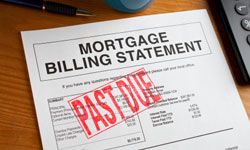The year was 2007. The U.S. stock market continued its record-breaking uphill climb. Unemployment was at a six-year low. And home prices across America were surging ever higher. In the hottest real estate markets, house "flipping" was all the rage. Despite high interest rates on mortgages, investors bought up single-family homes, apartments and townhouses and sold them within months for a hefty profit.
In the mad rush to cash in on the real estate boom, millions of Americans signed mortgages they couldn't afford, often encouraged by unscrupulous lenders. The logic was tempting: "Don't worry that your mortgage rate will double in two years, because you will sell this place in less than one." In the golden haze of 2007, that argument made sense. If only we could have predicted what happened next.
Advertisement
When the real estate market imploded in 2008, home values plummeted. Suddenly, the investment home you bought for $500,000 at the peak of the housing boom was worth only $250,000. Even if you could find a buyer at $250,000, you would still owe another $250,000 to your mortgage lender. That's called being underwater or upside down, when the balance on your mortgage is higher than the value of your home. Sadly, the most common result is defaulting on the loan. In 2009 alone, 2.8 million homes went into foreclosure, a 120 percent increase over 2007 [source: National Association of Realtors].
Foreclosures aren't the end of the world, but they can inflict serious damage to your credit score. Federal programs like the Home Affordable Refinance Program (HARP) offer assistance to underwater homeowners looking to refinance their mortgages, but not everyone qualifies. For more and more upside down borrowers, the best option is to attempt a short sale.
In real estate, a short sale means buying or selling a home for less than the balance owed on the mortgage. To do this, the seller has to convince the mortgage lender to forgive or cancel the unpaid debt. If approved, the benefits of a short sale include:
- Fair market price for the buyer
- Seller avoids foreclosure
- Mortgage lender recuperates some of the loan principle and avoids costly foreclosure process
Sounds easy, right? Not so fast. Short sale transactions are very complex and can take months to win approval. Even if the buyer and seller agree on a fair market price, the lender can deny the request for a number of reasons. Keep reading for a step-by-step explanation of the short sale process, the pros and cons, and some tips for a successful short sale experience.
Advertisement




